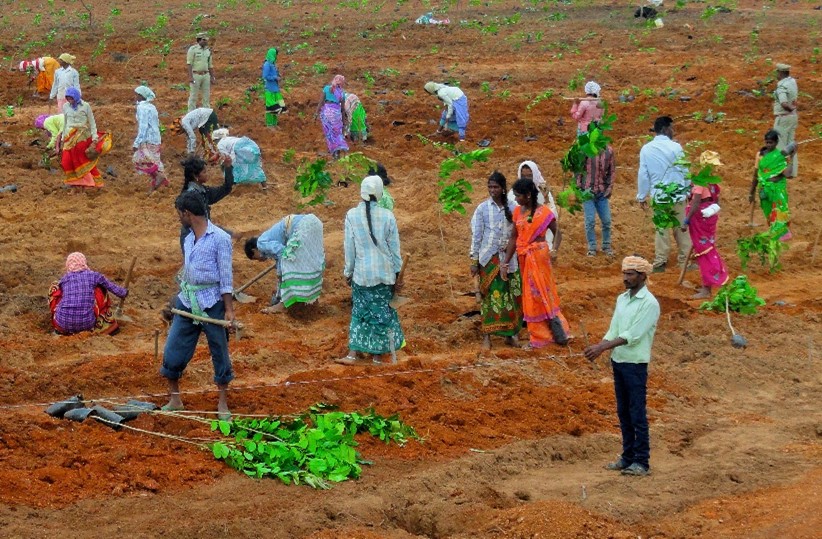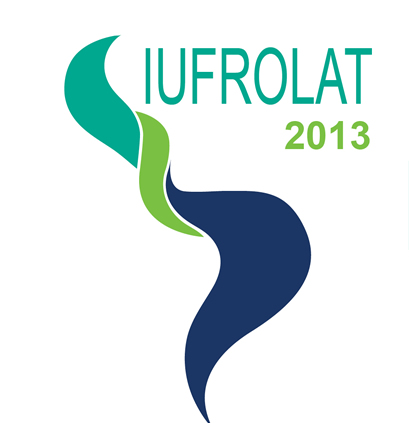IUFRO Spotlight #87 – Getting everyone on board to succeed in forest landscape restoration
IUFRO Spotlight #87 – Getting everyone on board to succeed in forest landscape restoration

Photo: Forest College & Research Institute, Telangana, India
The world is degraded. Worldwide, according to a 2018 UNESCO publication, land degradation affects 3.2 billion people – about 40% of humanity.
The degradation is human caused, drives species extinction, intensifies climate change, and adds to mass human migration and increased conflict, the report indicated.
So, a critical question becomes: how do we build or, perhaps more accurately, rebuild a sustainable world?
Read more…IUFRO Spotlight #77 – Stepping up the Global Discussion on Forest Education
IUFRO Spotlight #77 – Stepping up the Global Discussion on Forest Education
“The future is for the young generation,” said Dr. Shirong Liu of the Chinese Academy of Forestry.
“And,” he added, “changes in the forest sector have led to new trends in forest education globally.
Forest science is alive and well: 10 points from IUFRO 2017
NOTE: This text is reblogged from Boris Rantaša’s blog post at https://rantasa.me/2017/09/26/forest-science-is-alive-and-well-10-points-from-iufro-2017/
***********************************************************
September 26, 2017 – BORIS
From 17. to 22. September 2017 I took part in the IUFRO 125th Anniversary Congress in Freiburg, Germany. IUFRO stands for International Union of Forest Research Organization and is the oldest scientific union in the world. The congress presented the state of the art in forest research, development and practice.
I have tried to sum up what I learned at the congress in the 10 points below: Read more…
XXIV IUFRO World Congress 2014 – Call for Abstracts
 XXIV IUFRO World Congress
XXIV IUFRO World Congress
“Sustaining Forests, Sustaining People: The Role of Research”
Salt Lake City, Utah, USA: October 5-11, 2014
http://www.iufro2014.com/ – http://www.iufro.org/events/congresses/2014/
CALL FOR ABSTRACTS
PDFs for download:
Call for Abstracts – Llamado para enviar resúmenes – Appel à la soumission de résumés
Description of Congress Themes and Sessions
IUFROLAT III Key Messages
The Third IUFRO Latin American Congress under the theme of “Forests, Competitiveness and Sustainable Landscapes” held in San José, Costa Rica, from 12-15 June 2013, was an extraordinary experience as it brought together a unique range of actors from the natural resources sector of Latin America and provided an ideal platform for intensive discussion and exchange of experiences.
Inviting Latin America to play a bigger role in IUFRO
(Edited translation of press release)
Find the Spanish release written by Karla Salazar Leiva, CATIE Communications, at:
http://web.catie.ac.cr/iufrolat/IufroLat_prensa.htm
On 14 June, the Third IUFRO Latin American Congress (IUFROLAT 2013), one of the largest forest research events in Latin America, came to a close.
Third IUFRO Latin American Congress IUFROLAT III

12-15 June 2013
San José, Costa Rica
Congress website: http://www.web.catie.cr/iufrolat/Iufro_ing.htm
This blog will present highlights and impressions from IUFROLAT III, the Third IUFRO Latin American Congress which starts today in the city of San José, Costa Rica and will run until Saturday, 15 June 2013. The Congress has been organized together with CATIE, the Agricultural Research and Higher Education Center, RIABM, the Iberoamerican Model Forest Network, FAO and several IUFRO members in the region. The overall theme of the Congress is “Forests, competitiveness and sustainable landscapes” and one of its major goals is to place relevant science-based information at the disposal of decision makers.
With up to 600 expected participants, IUFROLAT III has exceeded all expectations and has outnumbered previous regional Congresses by far. This clearly shows the extraordinary interest and need of scientists in Latin America to share and exchange information on the issues that are high on the agenda in the region concerning forest and landscape management, ecosystem services and climate change adaptation and mitigation, among others. The Congress languages being Spanish, English and Portuguese will further contribute to ensuring an excellent exchange of knowledge and experience.
IUFRO is placing particular emphasis on strengthening forest-related research in regions. Regional congresses are aimed to promote quality research as well as maintain the momentum of IUFRO activities in the five-year periods between IUFRO World Congresses in a certain region.
The great success of previous regional congresses, especially the First African Regional Congress held in Nairobi, Kenya, almost exactly one year ago, have confirmed the great need for IUFRO’s focusing on defined geographic areas. The first two IUFRO Latin American Congresses in Valdivia (1998) and La Serena (2006), both organized by INFOR, the Forest Research Institute of Chile, and the European Regional Congress that took place in Warsaw, Poland (2007), are further excellent examples.
IUFRO Board Meeting
Right before the Congress, the IUFRO Board (http://www.iufro.org/who-is-who/board/) held its annual meeting and important issues concerning the future of the network, its leadership, venues of world congresses and strategic guidelines are on the agenda. The decisions made at this Board meeting will pave the way for the next Board term starting after the next IUFRO World Congress in October 2014 in Salt Lake City, USA (http://www.iufro2014.com/).
IUFRO-SPDC Pre-Congress Training Workshop: Communicating Forest Research – Making Science work for Policy and Management
San José, Costa Rica, June 9-11
Prior to the Congress, IUFRO’s Special Programme for Development of Capacities (IUFRO-SPDC), formerly known as the Special Programme for Developing Countries in coordination with CATIE, carried out a training workshop for early-career scientists from the Latin American Region to strengthen capacities and skills in forest science communication. The workshop brought together 16 participants from 11 regional countries.
One attendant, Eduardo Lopez Rosse from CIDES-UMSA and UMSS-Trópico, Bolivia, expressed his thoughts on the workshop. “The workshop was a great experience… I learned how to transmit scientific information outside the academic arena to other stakeholders, municipalities in my country, as well as to the general public.”
Another scientist, Mariana Moya, Extension Advisor at the Facultad de Agronomía, Universidad de Buenos Aires of Argentina had this to say, “We have a lot of people in Latin America working intensively with small farmers, with aboriginal communities, and we must communicate with governments, private companies, and different kinds of social organizations. It is helpful to me to see experiences from people who work in Brazil, Chile, Panama, and how they are communicating in their extension programs.”
The workshop which concluded today was an excellent demonstration of the SPDC’ capacity development efforts in building strengthened communication of forest research in a region.
It is important to note that IUFRO-SPDC through generous contributions by the Governments of Finland, Germany and the United States of America as well as the Center for International Forestry Research supports a total of 66 scientists in the framework of the Scientist Assistance Programme to attend the IUFROLAT Congress, bringing scientists who otherwise may not have had the opportunity to come to such an event.
Information about the Training Courses and IUFRO-SPDC:
http://www.iufro.org/science/special/spdc/
Forest and society: some thoughts on a possible interdisciplinary approach in IUFRO
Bikash Rath
Coordinator, IUFRO Working Party on Community Forestry (9.05.06)
PDF of full paper for download
Summary
Forests are the major source of our ecosystem services that the society avails for its sustenance and healthy growth. Forestry thus has continued to have a very complex and large social dimension with a number of interfaces between forest and society. These interfaces range from exploitation to protection & conservation. They form the key to an interdisciplinary approach between forestry sciences and social sciences, and create the potential for a mutual collaboration between the two. Read more…
